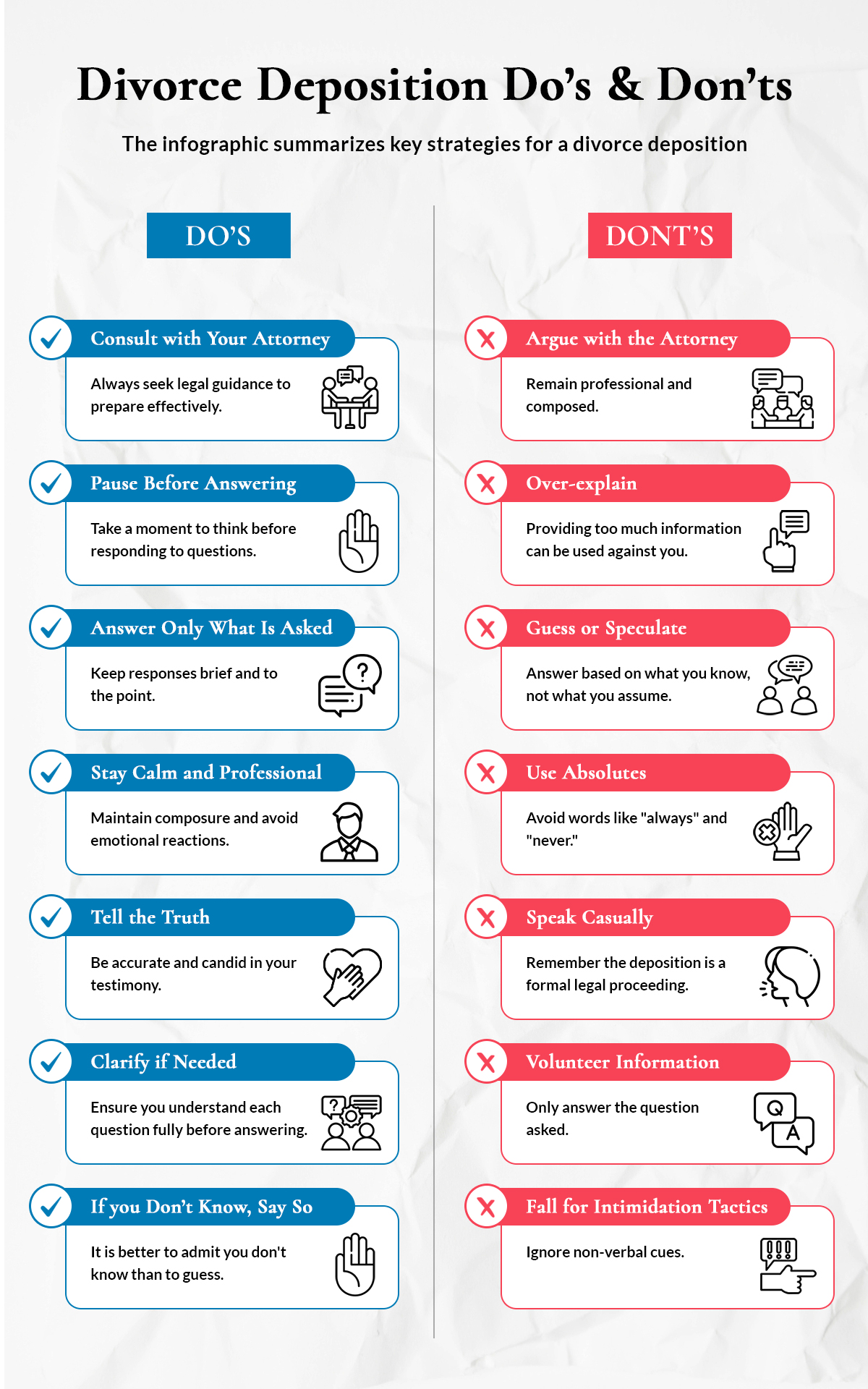A divorce deposition can be one of the most pivotal moments in your case. Whether you’re answering questions or preparing for your spouse’s testimony, proper divorce deposition preparation can make a significant difference in how your case proceeds. This guide explains what to expect in a divorce deposition, common pitfalls to avoid, and practical strategies to help you feel confident and ready. From understanding the legal deposition process to reviewing financial and parenting documents, preparation is key to protecting your interests.
What is a Deposition in Divorce or Family Law Matter?
A deposition is a formal legal proceeding where one party’s attorney questions the other party under oath. The session is recorded by a court reporter, and the transcript can be used in court. Depositions occur during the discovery phase of a case, allowing attorneys to gather information, assess credibility, and clarify disputed facts. The purpose of a deposition is to get answers to certain questions on the record and in writing. The transcript of a deposition can then be used in a final trial for a judge to review.
Who is Present During a Deposition?
- The deponent (person being questioned)
- Attorneys from both sides
- A court reporter
Why are Depositions Important?
- In a family law case, a judge will want to determine certain facts about the children and their well-being, the parties and history together, and relevant financial issues.
- Depositions help uncover financial information, parenting history, and key facts about the marriage.
- Testimonies can impact settlement negotiations or trial outcomes.
- They serve as a practice run for a trial.
- The attorneys may also depose the Guardian ad Litem (an attorney for the children) or a financial expert witness.
What to Expect During a Deposition
A deposition typically lasts 1-3 hours, depending on the complexity of the case. Expect questions about:
- Finances: Income, assets, debts, and expenses.
- Children: Parenting responsibilities, parenting styles, decision making, and interactions with the other parent.
- Relationship History: Reasons for the divorce, allegations of abuse, or significant marital events.
- Work and Lifestyle: Employment history, daily routines, and living arrangements.
Step-by-Step Guide to Preparing for Your Divorce Deposition
- Consult with Your Attorney
Your lawyer should guide you through the process, anticipate difficult questions, and help you craft effective responses.
- Review Key Documents
Gather and review:
- Financial statements
- Parenting agreements
- Emails or texts related to the divorce
- Any court filings or pleadings
- Practice Answering Questions
Do a mock deposition with your lawyer to improve clarity and confidence. You should become familiar with the kinds of questions you will be asked and be comfortable answering them. Be careful not to over-review! You don’t want to sound rehearsed or robotic when the time comes for the real thing.
- Know Your Rights
Understand what questions you must answer and what objections your lawyer can raise. You are not required to speculate or guess during a deposition
Strategies for Answering Questions Effectively
Pause Before Answering:
Before answering each question, take a deep breath for at least 2 seconds. Taking a moment to pause before answering a question allows you to fully understand it, recall relevant information, and formulate a concise and accurate response. Pausing helps prevent the inadvertent release of information or contradictions. Pausing gives you control of the deposition’s tempo and ensures that you, rather than the opposing attorney, dictate the pace. This not only ensures that your answer is well thought out, but it also provides your attorney time to object to the question if necessary.
Only Answer What is Asked:
Providing concise answers focused solely on the question asked prevents you from volunteering unnecessary information that could be used against you.
For example, answering “yes” or “no” to a question such as “Do you know what time it is?” prevents you from offering additional information that was not specifically requested. Volunteering information gives the opposing attorney more material to work with and potentially exploit.
By being disciplined in your responses, you limit the scope of the deposition and maintain greater control over your testimony.
Avoid Absolute Terms:
Using words like “always” and “never” can create opportunities for the opposing attorney to challenge your statements with specific examples that contradict your claims.
Qualifying your statements with less definitive language maintains accuracy and prevents your testimony from being easily undermined. Recognizing the potential impact of absolute terms enables you to present a more nuanced and defensible account of events.
If You Don’t Remember, Say So:
It is better to admit that you do not remember a fact than to guess or provide inaccurate information.
“I do not know” is an appropriate answer in a deposition. Guessing can lead to inconsistencies that damage your credibility. Being honest about the limits of your memory preserves your integrity and prevents the opposing attorney from exploiting false statements.
Stay Calm and Professional:
Maintaining composure prevents emotional reactions that can be misconstrued or used against you.
Arguing with the attorney should be avoided to remain professional and composed. Remaining calm allows you to think clearly and respond strategically.
Ignore Intimidation Tactics, Especially by Opposing Counsel:
Opposing counsel may use silence, non-verbal cues, or aggressive questioning to provoke you or suggest your answers are inadequate.
Attorneys sometimes engage in ploys of suggesting by silence that you should give a different or more complete answer. Recognizing these tactics helps you avoid feeling pressured to offer more information than necessary or to change your accurate answers
Common Mistakes to Avoid in a Divorce Deposition
Guessing Answers:
Always say “I don’t know” if unsure. It is better to admit that you do not remember a fact than to guess or provide inaccurate information. “I do not know” is an appropriate answer in a deposition. Witnesses sometimes conceal their lack of knowledge by guessing. Guessing can lead to inconsistencies that damage credibility. Guessing opens the door to speculation and potentially inaccurate information that can be used against you later
Arguing With the Attorney:
Stay polite and professional. Remaining professional and composed is important. Arguing with the attorney should be avoided to remain professional and composed. Arguing can be perceived negatively by the court reporter or any judge who might later review the transcript. Even if opposing counsel is aggressive or seems unfair, maintaining a calm and respectful demeanor is crucial
Over-Explaining:
The more you say, the more they have to use against you. The client needs to realize that a deposition is not the time to explain or tell their story. The deponent simply needs to answer the question and should practice answering questions without giving extra information. Brevity is important. Providing concise answers focused solely on the question asked prevents you from volunteering unnecessary information that could be used against you
Speaking Too Casually:
A deposition is a formal legal process, not a casual conversation. Depositions can seem very informal, but you cannot let the informality mislead you. Avoid using slang, humor, or discussing irrelevant personal matters. Maintain a formal and respectful tone throughout the deposition.
Download Divorce Deposition Dos and Don’ts
After the Deposition: Next Steps
Based on the deposition, your lawyer may advise a settlement negotiation or trial preparation.
Review Your Transcript: Carefully read your deposition transcript. Correct any inaccuracies or omissions that could harm your case. Compare it to your memory of the questions and answers. Small corrections are fine, but big changes can raise doubts about your credibility.
Discuss Next Steps with Your Attorney: Discussing how your testimony impacts your case strategy is essential, including settlement options and trial preparation. Your attorney can determine if the deposition revealed new information requiring further investigation.
Consider Settlement or Trial: Your deposition’s outcome influences whether to settle or proceed to trial. A strong deposition can increase confidence, while a weak one might encourage settlement. The deposition helps refine your trial strategy.
Get Legal Guidance: Consult an experienced divorce lawyer before and after the deposition to understand the implications of your testimony and plan your next steps.
Manage Stress: Depositions can be stressful. Seek support from your attorney, a therapist, or loved ones.
Ensure Accuracy: Inconsistent statements between your deposition and later testimony can damage your credibility in court.
Checklist: How to Prepare and What to Bring to Your Deposition
This checklist is designed to help you gather all necessary documents and remember key preparation steps for your divorce deposition.
- Consult with Your Attorney: Schedule a meeting to discuss potential questions and strategies.
- Financial Records: Gather all relevant financial statements, including bank statements, investment records, and tax returns. Compile documents related to assets, debts, income, and expenses.
- Custody Documents: Include any existing child custody agreements or parenting plans. Collect documents related to parenting responsibilities and interactions with your spouse.
- Legal Papers: Bring copies of court filings or pleadings related to the divorce. Include emails or texts related to the divorce.
- Personal Notes: Prepare notes on key events, dates, and details related to your relationship history. Outline your employment history, daily routines, and living arrangements.
- Professional Attire: Dress professionally to make a positive impression.
- List of Questions: Prepare a list of questions to discuss with your attorney after the deposition.
- Transcript Review: Remember that you have the right to review the deposition transcript for errors.
Final Thoughts
A divorce deposition is a high-stakes event that can influence everything from financial settlements to child custody arrangements. By preparing strategically and following best practices, you increase the likelihood of a favorable outcome. Work closely with your attorney and remain composed under pressure.
If you need legal guidance tailored to your case, consult with a trusted divorce attorney as early as possible. Their expertise can help you avoid common pitfalls and protect your interests throughout the process.
















